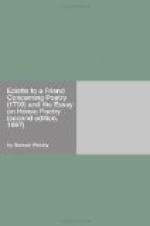Models from thence, and copies every Grace: }
Each Page is big with Virgil’s Manly Thought,
To follow him too near’s a glorious Fault.
He dar’d be virtuous in the World’s Despite, 750
While D——n lives he dar’d a Modest Poem write.
Who can th’ ingenious S——y’s Praise refuse,
Who serves a grateful Prince, and grateful Muse?
Or P——r read unmov’d, whose every Page
So just a Standard to the opening Age?
Neat S——n’s courtly Vein’s correct and clear,
Nor shall he miss his Praise and Station here:
Nor should the rest whom I unnam’d must leave,
(Tho such Omission they’ll with ease forgive:) 760
Unknown to me, let each his Works commend,
Since Virtue, Praise, as Shame does Vice attend.
Poets, like Leaves and Words, their Periods know,
Now fresh and green, now sear and wither’d grow;
Or burnt by Autumn’s Heat, and Winter’s Cold,
Or a new hasty Birth shoves off the old.
Happy are those, and such are some of ours, }
Who blest by bounteous Heav’n’s indulgent Show’rs }
Bear wholsome Fruit, and not gay pois’nous Flow’rs: }
Who would not ev’n a Lawreat’s self commence 770
Or at their Virtue’s or their Faith’s Expence:
Renounce their Creed to save a wretched Play, }
And for a crowded House and full Third Day }
At one bold Stroke throw all their Heav’n away. }
What gain’d Euripides by all his Sense,
Who madly rail’d against a Providence?
Apostate Poets first seduc’d Mankind,
But ours upon the Pagan Herd refin’d;
They Vertue prais’d at least, which ours abuse,
And more than Paganize the Heav’n-born Muse: 780
No Signs of Grace, or of Repentance show,
Like Strumpets lash’d, more impudent they grow.
Now learn, my Friend, and freely I’ll impart
My little All in this delightful Art:
Of Poetry the various Forms and Kinds,
The widest, strongest Grasp of human Minds:
Not all from all, but some from each I take,
Since we a Garland not a Garden make.
[Sidenote: Epic.]
EPIC’s the first and best, which mounting sings }
In Mighty Numbers worthy mighty Things, } 790
Of High Adventures, Heroes, Gods and Kings: }
By lively Schemes the Mind to Vertue forms,
And far beyond unactive Precept warms.
The Subject may be either feign’d or true,
Too Old it should not be, but less too New:
Narration mixt with Action most delights,




